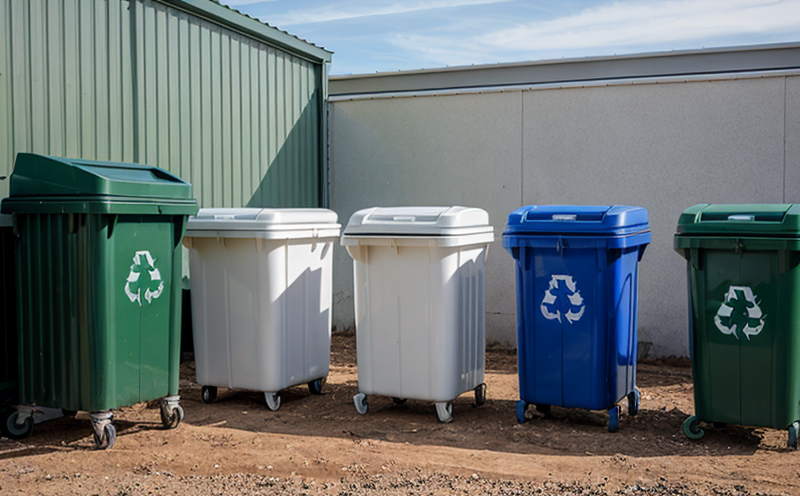EN 14995 Biodegradable Plastics Test
The EN 14995 biodegradable plastics test is a critical component of sustainability initiatives, ensuring that plastic materials decompose in natural environments without leaving harmful residues. This standard is particularly important for the packaging industry as it drives innovation towards more environmentally friendly materials.
The testing procedure outlined in EN 14995 involves subjecting samples to specific conditions designed to simulate biodegradation processes. These tests are not only mandatory for compliance but also serve as a benchmark for companies aiming to demonstrate their commitment to environmental responsibility. The test parameters are meticulously defined, ensuring that all participants follow the same stringent protocols.
One of the key aspects of this testing is the use of controlled environments such as industrial composting systems or soil burial conditions. These tests help determine how quickly a material breaks down under these conditions and whether any harmful substances are released during decomposition. The standard also covers biodegradation in freshwater, seawater, and anaerobic digestion processes.
For accurate testing, it is essential to prepare the specimens correctly. This includes cutting the samples into standardized sizes, ensuring they are free from contaminants, and maintaining consistent moisture levels. Proper sample preparation ensures that test results are reliable and comparable across different laboratories.
The testing process itself involves monitoring biodegradation over time using various analytical methods such as gravimetric analysis to measure weight loss, chemical analyses for detecting organic compounds, and microbial assays to assess the presence of microorganisms involved in decomposition. Compliance officers responsible for ensuring adherence to environmental regulations can rely on these tests to verify that their products meet stringent standards.
Quality managers looking to improve product performance may find value in this test as it provides insights into potential improvements needed before finalizing a biodegradable plastic formula. R&D engineers can leverage the results from EN 14995 testing when developing new formulations or refining existing ones. By adhering to these standards, companies not only enhance their reputation but also contribute positively towards reducing waste and pollution.
Proper compliance with EN 14995 is crucial for ensuring that products labeled as biodegradable truly live up to this claim. Non-compliance could lead to legal consequences and damage the brand’s image among eco-conscious consumers. Therefore, it is advisable for manufacturers to seek out reputable third-party laboratories equipped with state-of-the-art facilities capable of conducting these rigorous tests accurately.
In summary, EN 14995 provides a robust framework for evaluating biodegradable plastics’ environmental impact, enabling stakeholders across the supply chain—from raw material suppliers to end users—to make informed decisions about sustainable packaging solutions. By integrating this standard into their operations, businesses can demonstrate genuine commitment to reducing environmental footprint while meeting regulatory requirements.
Frequently Asked Questions
Benefits
Achieve compliance with international standards for biodegradable plastics.
Enhance brand reputation through transparent communication of product sustainability claims.
Increase market competitiveness by meeting growing consumer demand for eco-friendly products.
Support regulatory requirements and avoid potential legal issues related to non-compliance.
Promote innovation within the R&D department by providing insights into material performance under real-world conditions.
Foster better decision-making processes for procurement teams by ensuring suppliers meet rigorous testing criteria.
Customer Impact and Satisfaction
The results of EN 14995 tests play a crucial role in enhancing customer trust and satisfaction. When manufacturers can demonstrate that their products comply with these stringent environmental standards, they are more likely to build long-term relationships with environmentally conscious consumers who value sustainability.
Companies that excel at meeting such requirements not only gain competitive advantages but also contribute positively towards achieving global goals related to reducing plastic waste and promoting circular economy principles. This approach helps create a positive perception of the brand among stakeholders, ultimately leading to increased loyalty and market share.
Use Cases and Application Examples
The application of EN 14995 extends beyond mere compliance; it offers practical solutions for addressing specific challenges faced by businesses operating within this sector. Here are some real-world use cases:
Developing new biodegradable packaging materials that meet strict ecological criteria.
Ensuring existing products align with evolving regulatory expectations regarding sustainable practices.
Facilitating the transition towards circular economy models by identifying suitable compostable alternatives for traditional plastics.
Promoting transparency in supply chains through third-party verification of biodegradability claims made about packaging materials.
These examples illustrate how adopting EN 14995 testing can benefit various aspects of a company’s operations, from research and development to marketing strategies aimed at appealing to environmentally aware customers.





